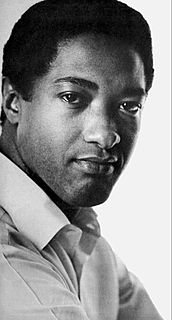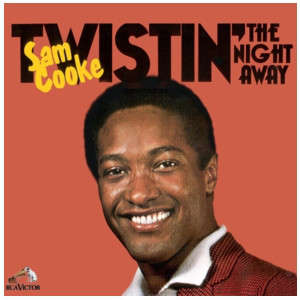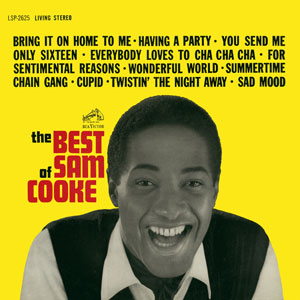
Samuel Cook, known professionally as Sam Cooke, was an American singer, songwriter, and entrepreneur. Considered to be a pioneer and one of the most influential soul artists of all time, Cooke is commonly referred to as the "King of Soul" for his distinctive vocals, notable contributions to the genre and high significance in popular music.

The Sun Sessions is a compilation album by American singer Elvis Presley, containing songs he recorded at Sun Studios in 1954 and 1955. It was issued by RCA Records in 1976, and had been issued and charted as The Sun Collection in the UK the previous year. It features liner notes by Roy Carr of the New Musical Express. The Sun Sessions features most of the tracks Elvis recorded at Sun studio and were produced by Sam Phillips, the head of Sun Studios. Elvis began his singing career with Sun Records label in Memphis. The album reached number two on the Billboard Country Albums.

"A Change Is Gonna Come" is a song by American recording artist Sam Cooke. It initially appeared on Cooke's album Ain't That Good News, released mid-February 1964 by RCA Victor; a slightly edited version of the recording was released as a single on December 22, 1964. Produced by Hugo & Luigi and arranged and conducted by René Hall, the song was the B-side to "Shake".

The discography of Sam Cooke, an African-American recording artist, singer-songwriter and entrepreneur, consists of fourteen studio albums, two live albums, and numerous compilations. Over the course of his eight-year career, Cooke placed 29 singles in the Top 40 on the Billboard Pop Singles chart. He also placed 20 singles in the Top Ten of Billboard's R&B chart, Black Singles chart. Between 1957 and 1960, Sam Cooke's records were produced on the Keen label. From 1960 through 1966, they were produced on the RCA label.

"Wonderful World" is a song by American singer-songwriter Sam Cooke. Music arrangement was by the prolific Belford Hendricks who also wrote the arrangements for the songs "You Send Me", "Cupid", "Chain Gang", "(I Love You) For Sentimental Reasons", and "A Change Is Gonna Come". Released on April 14, 1960, by Keen Records, it had been recorded during an impromptu session the previous year in March 1959, at Sam Cooke's last recording session at Keen. He signed with RCA Victor in 1960 and "Wonderful World," then unreleased, was issued as a single in competition. The song was mainly composed by songwriting team Lou Adler and Herb Alpert, but Cooke revised the lyrics to mention the subject of education more.

"You Send Me" is a song written and originally recorded by American singer Sam Cooke, released as a single in 1957 by Keen Records. Produced by Bumps Blackwell and arranged and conducted by René Hall. The song, Cooke's debut single, was a massive commercial success, becoming a No. 1 hit on both Billboard's Rhythm & Blues Records chart and the Billboard Hot 100.

"Twistin' the Night Away" is a song written and recorded by Sam Cooke. It was released as a single in 1962 and became very popular, charting in the top ten of both the Billboard Hot 100 (#9) and Billboard's R&B chart (#1). "Twistin' the Night Away" was successful overseas as well, peaking at #6 on the UK Singles Chart.

George Sylvester "Red" Callender was an American string bass and tuba player. He is perhaps best known as a jazz musician, but worked with an array of pop, rock and vocal acts as a member of The Wrecking Crew, a group of first-call session musicians in Los Angeles.

The Man and His Music is a 1986 compilation album by Sam Cooke, released posthumously. It debuted about a month after Cooke was inducted into the Rock and Roll Hall of Fame.

"Little Red Rooster" is a blues standard credited to arranger and songwriter Willie Dixon. The song was first recorded in 1961 by American blues musician Howlin' Wolf in the Chicago blues style. His vocal and slide guitar playing are key elements of the song. It is rooted in the Delta blues tradition and the theme is derived from folklore. Musical antecedents to "Little Red Rooster" appear in earlier songs by blues artists Charlie Patton and Memphis Minnie.

Night Beat is the tenth studio album by American singer Sam Cooke, released in August 1963 by RCA Victor.

The Best of Sam Cooke is the second greatest hits album by American singer-songwriter Sam Cooke. Produced by Hugo & Luigi, the album was released in 1962 in the United States by RCA Victor. The compilation contains most of Sam Cooke's most well-known hits from 1957 to 1962.
"You Gotta Move" is a traditional African-American spiritual song. Since the 1940s, the song has been recorded by a variety of gospel musicians, usually as "You Got to Move" or "You've Got to Move".

Portrait of a Legend: 1951–1964 is a compilation album by American singer-songwriter Sam Cooke, released posthumously on June 17, 2003, by ABKCO Records. The disc covers Cooke's entire career, from his early 1950s beginnings with the Soul Stirrers to the posthumous 1964 single "Shake". The collection includes most of the singer's hit singles, including "You Send Me", "Wonderful World", "Chain Gang", "Cupid", "Twistin' the Night Away", "Bring It On Home to Me", "Another Saturday Night", "Little Red Rooster", "Ain't That Good News", "Good Times", and what is often regarded as the singer's magnum opus, "A Change Is Gonna Come".

"Cupid" is a song by American singer Sam Cooke, released on May 16, 1961. It charted at number 17 on the Billboard Hot 100 and number 20 on the Hot R&B Sides chart; the track performed best in the United Kingdom, peaking at number seven on the UK Singles Chart. Cooke's producers had asked him to write a song for a girl they had seen on a Perry Como TV show — but once they heard her sing, they kept "Cupid" for Cooke himself. It was Cooke's idea to drop in the sound of an arrow being fired "straight to my lover's heart." Personnel on the recording included Cooke's session regulars Clifton White and Rene Hall on guitar, Clifford Hills on bass, Earl Palmer on drums and Joseph Gibbons on guitar and banjo.

Ain't That Good News is the eleventh and final studio album by American R&B and soul singer-songwriter Sam Cooke, released mid-February 1964, on RCA Victor Records, in both mono and stereo, LPM 2899 and LSP 2899. Recording sessions for the album took place at RCA Victor's Music Center of the World Studio in February and December 1963 and January 1964. The cover photo was taken by American photographer Wallace Seawell. Ain't That Good News was the final studio album to be issued during Cooke's lifetime, before his death at the age of 33. With the exception of "Another Saturday Night", which had been released as a single early in the previous year, Ain't That Good News comprised the first material that Cooke had recorded in the six months following the drowning death of his 18-month-old son Vincent.

Sam Cooke at the Copa is a live album by American singer-songwriter Sam Cooke. The album was released in 1964 in the United States by RCA Victor. It was Cooke's only live album to be released during his lifetime; Live at the Harlem Square Club, 1963, although recorded earlier, was not released until 1985. Copa was reissued in 2003, with remastered sound.
The following is a comprehensive discography of Neil Sedaka, the American singer.

Twistin' the Night Away is the eighth studio album by American singer-songwriter Sam Cooke. Produced by Hugo & Luigi, the album was released in April 1962 in the United States by RCA Victor. Twistin' the Night Away primarily capitalizes on the twist phenomenon and as a result became one of Cooke's most successful LPs, becoming his second to chart and creating a string of chart successes.
"Somebody Have Mercy" is a song by American singer-songwriter Sam Cooke, originally released in April 1962 on the album Twistin' the Night Away. The song later was selected for the B-side of the single "Nothing Can Change This Love", which was released on September 11, 1962. It received enough airplay to make the Billboard charts on its own, peaking at No. 3 R&B and No. 70 Pop.


















